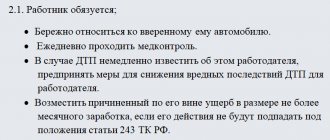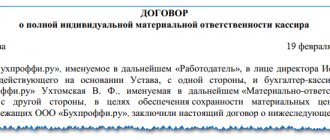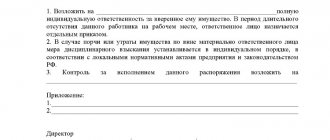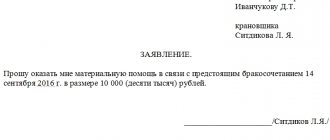When is an agreement on full collective financial responsibility drawn up?
An agreement on collective liability (CLL) is concluded to determine the scope and boundaries of the responsibility of a collective of workers related to ensuring the safety of the company’s property. In addition to these issues, the text of the DKMO is supplemented with a damage compensation scheme, taking into account the degree of guilt of each member of the team.
IMPORTANT! Registration of the DKMO is provided for in Art. 245 of the Labor Code of the Russian Federation, its subject is collective financial responsibility, which arises when it is impossible to outline the boundaries of responsibility of each employee when performing work together.
A conclusion with the DKMO team is required when employees perform joint work related to the storage, processing, sale (release), transportation, use or other use of valuables.
IMPORTANT! Before concluding the DKMO, it is necessary to check the list of works specified in the Decree of the Ministry of Labor of the Russian Federation dated December 31, 2002 No. 85. If it does not include the type of work performed by the team, execution of the DKMO is meaningless (the contract will not have legal force).
Labor legislation very succinctly outlines the format of the Labor Code of Labor - a mandatory written form and a specific list of the team (team). At the same time, the company must have employment contracts drawn up with all team members.
“Unified Form No. TD-1 - Employment Contract” will help you formalize labor relations with employees .
In other words, employees whose names are named in the DKMO are responsible to the employer for the safety of the property entrusted to them and are obliged to compensate the cost if it is lost or damaged. A team member can avoid negative material losses due to compensation for damage only in one case - if he proves that he is not to blame for the loss or damage to the company’s assets.
Design features
Let's take a closer look at the features of formalizing the responsibility of a group of employees for trade professions. To do this you need:
- Approve the staffing table and list of employees whose activities are mentioned in the List.
- Decide whether common responsibility for all employees or team responsibility is appropriate for a given case, at a given outlet. The difference between them is that collective responsibility applies to the entire store team, while team responsibility applies to part of it, for example, a shift, a specific department or section of goods.
- Issue an order to conclude an agreement on CMO, appoint a team (team) leader and his replacement, and familiarize all employees with it.
In a situation where the obligation to respond financially must be assigned to an already working employee, the KMO agreement will be considered as a change in the terms of the employment agreement (Article 74 of the Labor Code of the Russian Federation). The employer is obliged to notify the employee about this no later than 2 months before such a change, and in case of refusal, offer him another vacancy in writing. If there is no vacancy or the employee refuses the offer, the employment agreement is terminated (clause 7, part 1, article 77 of the Labor Code of the Russian Federation).
To sign an employment agreement, the employer must:
- Carry out an inventory, based on the results of which, issue a certificate of transfer of the MC to the team.
- Draw up and sign a KMO agreement with each team member.
The employer must conclude a collective agreement with all members of the team (team) (Part 2 of Article 245 of the Labor Code of the Russian Federation), which must be signed by each employee of the team (team). The form of the collective liability agreement must be prepared in advance and all members of the team must be familiarized with its contents. Wherein:
- the collective agreement is renegotiated if the team leader changes or if more than 50% of its original composition leaves the team;
- The collective agreement is not renegotiated when individual workers leave the team or new ones are hired. In these cases, the date of his departure is indicated opposite the signature of the retired team member, and the newly hired team member signs this contract and indicates the date of joining the team.
General and mandatory points of the DKMO
General (managerial) aspects of the operation of the DKMO are reflected in a separate section and include the following:
- compliance with the principle of voluntariness when forming a team;
- appointment of a foreman taking into account the opinion of the team;
- assignment of duties to a temporarily absent foreman;
- an unconditional requirement to re-conclude the DKMO when the team changes by 50%;
- entering additional information into the DKMO, which does not lead to its re-conclusion, upon the admission or departure of its members from the brigade.
An important part of the DKMO is the section on the rights and obligations of the parties to the agreement. The team and the employer are subject to a set of mandatory procedures, which can be grouped into 3 groups:
- the team is obliged to ensure the safety of the entrusted property, and the employer is obliged to organize the necessary conditions for this;
- the team is obliged to promptly inform management about cases that threaten the safety of property, and the employer is also obliged to promptly influence their elimination;
- the foreman must monitor the movement and take into account the balances of the entrusted assets, as well as report on this, and the employer must provide appropriate conditions for this.
In addition to those indicated, the employer is assigned 2 additional groups of responsibilities:
- provide the team with up-to-date information about current legislation in the field of liability, regulatory nuances of the procedure for storage and other operations with property;
- take into account the opinion of the brigade in various issues related to the formation of the brigade, or when considering the validity of requests for an inventory of assets entrusted to the brigade.
Learn the nuances of conducting and registering an inventory in the materials posted on our website:
- “Inventory order - sample filling”;
- “Unified form No. INV-3 - form and sample”.
The same section of the DKMO establishes the rights of the brigade - we’ll talk about this later.
DKMO about “team” rights
The rights of the team are an important point in the procedure for formalizing its “material” relationship with the employer. DKMO may provide for the following collective rights:
- take part in the acceptance of entrusted property;
- exercise mutual control over the storage system, processing, sale, transportation and other operations with entrusted assets;
- participate in the verification of received property (inventory, audit, etc.);
- get acquainted with the reporting on the entrusted property (about its movement and balances);
- require an inventory of entrusted assets (if the team considers this necessary);
- notify the employer about the removal of team members (including the foreman) who, in the opinion of the team, do not ensure the safety of the company’s assets.
Procedure for attraction
Damage may occur under various circumstances:
shortage; damage to property/equipment; causing harm through negligence (including during non-working hours); transfer of information constituting a trade secret to third parties.
In general, the sequence of actions of the employer looks like this:
- One of the above facts is revealed.
- An inspection is carried out to determine the cause, amount of damage and the person responsible. For this purpose, the work of a commission is organized, which draws up an act based on the results.
- A written explanatory statement is requested from the employee; in case of refusal to provide it, the commission must also draw up a report.
- Making a decision to withhold a certain amount as compensation, signing the corresponding order from the manager.
Funds are collected based on:
- agreements of the parties;
- order of the employer (in case of disagreement of the employee);
- by court decision (if the employee went there to protect his rights).
The fact of dismissal at any stage of the inspection or after it does not relieve the employee of the obligation to compensate for material damage in full.
Compensation Section
It is impossible to do without the section on compensation for damage in the DKMO - both for the employer and for the team members, this issue is of great importance.
If the team treats the entrusted property responsibly, makes every possible effort to ensure its safety, does not allow damage or loss, and the employer provides the necessary conditions for this, there will be no need to apply the provisions of this section (in the absence of force majeure circumstances).
However, such situations do not always arise, so the development of this section in the DKMO must be approached with the utmost care.
IMPORTANT! In accordance with Art. 232 of the Labor Code of the Russian Federation, the party to the employment contract who is guilty of its occurrence is obliged to compensate for material damage caused to the company’s assets.
To ensure that those responsible for loss or damage to property compensate for damage legally and in reasonable amounts, the employer will have to work hard. The algorithm of its actions can be presented as follows:
- Make sure that the damage or loss of the company’s assets did not occur due to insufficient organization by the administration of the conditions necessary to ensure safety.
- Comprehensively consider the presence or absence of circumstances that could exclude the financial liability of the team (Article 239 of the Labor Code of the Russian Federation).
- Confirm the existence of direct actual damage and its amount.
- Establish a causal relationship between the actions of the team and the occurrence of damage.
- Prove the illegality of the behavior (actions or inactions) of the team workers.
- Comply with legal requirements when recovering damages from employees.
All actions of the employer must be based on the requirements of labor legislation, take into account judicial practice in matters of liability and compensation for damage, and also be reflected in the Labor Code.
You can download a sample collective liability agreement on our website:
Legality of introduction
The most common KMO in stores. Is this legal? The introduction of collective responsibility is legal if all formalities are met:
- Availability of an organization order.
- Familiarization of employees with the order against signature.
- Conclusion of the CMO agreement.
The sample agreement is specified by a resolution of the relevant body. However, this sample is considered advisory. The manager has the right to make adjustments to it in accordance with his own needs.
If all legal grounds for introducing KMO are present, the employee is required to sign the appropriate agreement. If he does not do this, he may be dismissed on the grounds of failure to perform job functions.
The KMO action begins from the moment the fact of damage is established. The amount to cover the damage is divided equally between all representatives of the team who signed the agreement. Employees may not agree with the manager's decision. In this case, you cannot simply refuse to pay. You need to file a claim in court. Court representatives separately determine the amount of damage. Conflicts concerning KMO are resolved by the World Court or the labor commission.
Results
An agreement on collective financial responsibility is concluded between the team (team) and the employer in conditions where it is impossible to establish the responsibility of each employee for the safety of the entrusted property when performing work together.
This document stipulates all the important aspects: the rights and obligations of the parties, the procedure for compensation for damage, etc., and as a basis you can take the text of a standard agreement from the resolution of the Ministry of Labor of the Russian Federation of December 31, 2002 No. 85, supplementing it with in-house nuances.
You can find more complete information on the topic in ConsultantPlus. Free trial access to the system for 2 days.
Who can't make a deal with
Cases of applying full financial liability to employees are limited:
- the person responsible for the damage must be 18 years old;
- labor responsibilities must be related to monetary and commodity values;
- The position or duties of the employee must be contained in the List (Resolution of the Ministry of Labor dated December 31, 2002 No. 85).
The List names cashiers, salespeople, administrators and managers of trade enterprises. To establish collective financial responsibility in the field of trade, you can be guided by Order of the USSR Ministry of Trade dated August 19, 1982 No. 169, although it regulates issues only for state trade.
In accordance with the Order of the Ministry of Trade (clause 3.7), team financial responsibility cannot extend to some sales workers, for example:
- persons working part-time or part-time, if they, together with other employees, do not manage commodity assets;
- trainees of educational institutions, students studying directly at trade enterprises;
- those with no experience working with material assets: graduates of higher and secondary specialized educational institutions and the vocational education system and persons who have undergone on-the-job training during the first year of work.







